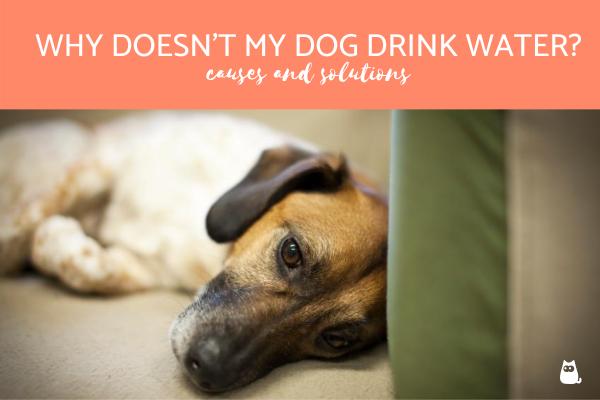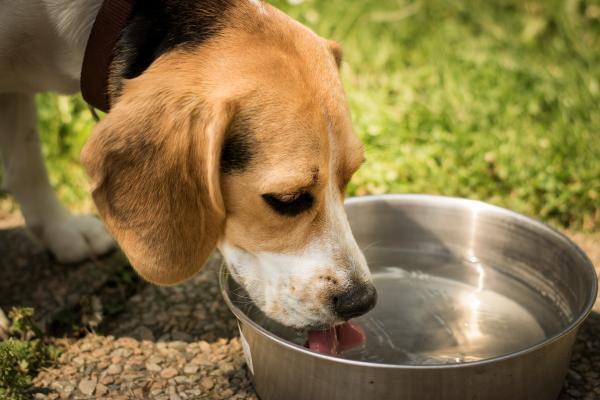Why Doesn't My Dog Drink Water?



See files for Dogs
Dehydration in dogs can lead to serious health issues. This is why it's important for us to make sure our dogs are drinking enough water for their body's needs and the amount of exercise they do. Unfortunately, in some cases, dogs may stop drinking water all out of a sudden. As their caregiver, it's only normal to worry in this situation.
In this AnimalWised article we're going to explain the causes and solutions as to why your dog doesn't drink water anymore. Continue reading to learn more!
Why your dog doesn't drink water
There are a number of reasons why your dog may have stopped drinking water. Nevertheless, we're going to go through the most common causes for why dogs stop drinking water out of a sudden. They are the following:
Lack of activity
Inactivity can directly affect your dog's thirst. For example, if it's a cool day and your dog hasn't gone out for their walk yet, it's understandable that they're not thirsty. However, if it's summer and they have gone on a walk but still refuse to drink water, then that is a good reason to worry.
Change in water
Dogs love routine. They will get used to their daily walks, where their bed is set and even the taste of their water. If you've recently changed the water you provide your dog with or even the container or placement, they may not be too happy about it. They will need time to get used to the new placement or taste of water.
New environment
Many times, dogs will refuse to eat or drink in a new environment they are not used to. This has to do with our last point that they are an animal of habit. Most dogs will need a bit of time to get used to a new place. For example, some dogs refuse to drink water when they go out on a walk even when offered fresh water in a bowl on a summer day. While others, have no issue accepting water in a new environment. It will depend on each dog.
Age
Older dogs are known to drink less water than younger dogs. This is usually because they don't exercise as much as younger dogs. They also tend to experience a lack of appetite. Nevertheless, as their caregivers we must make sure they are drinking enough water and eating enough food so they can have a healthy and happy lifestyle.
Traumas
Another reason why a dog may have stopped drinking water out of a sudden is due to a past trauma. Dogs learn through association. Unfortunately, if they relate something, someone or someplace to a negative experience, they will need some time to re-learn and try to associate it with something positive in order to get over the trauma.
This can affect them from drinking water if they experienced a negative situation when drinking or close to that area. It may have been a punishment, someone accidentally stepped on them when they were drinking, someone was screaming when they were drinking, etc. Dogs may incorrectly associate it with drinking or the water bowl, but this will need time and gentle help in order for them to disassociate it from drinking.
Health Issue
The last, and most serious, cause is an underlying health issue. A common symptom for many health issues (diabetes, kidney issues, etc.) is if the dog stops drinking or eating. If you notice that your dog is also experiencing pain, discomfort or having other abnormal behaviour, they most likely have a health issue and you will need to take them to the veterinarian as soon as possible.

How to help your dog drink water
Here are some ways to help your dog drink water when they are refusing to drink water:
Take them to the veterinarian
It's best to rule out health issues first. They way, you detect any health problems as early as possible. Your veterinarian will also be able to best guide you through any abnormal behaviour your dog may be experiencing.
Increase activity level
Try slowly increasing your dog's duration or quantity of walks per day. Try offering them water once they're done and feel hot and thirsty.
Clean the water bowl
As always, remember to clean their water bowl with soap and water to eliminate any remaining bacteria. This way, you'll ensure your dog doesn't get sick and you'll encourage them to drink more fresh and clean water. Remember to change the water at least once per day. Just like us, our dogs prefer fresh water.
Change the water or bowl
Another idea is to change the type of water (tap, from the bottle, etc.) or the bowl. If your dog doesn't like the taste of the water they may begin to drink again once it's changed. In the case that your dog has associated the bowl with a trauma, try changing the water bowl. Perhaps this will help them give it a try and see that everything is okay.
Change the position
Similarly to changing the bowl, you can also try changing the position of their water bowl. This can help them re-associate their water bowl to something different and, hopefully, positive.
How much water your dog needs
If your dog usually eats dry food, use this simple method to know how much water they should be drinking: multiply the weight of the food by 2.5. Nevertheless, it will also depend on the weight of your dog and the amount of exercise they do (also the weather).
Water should always be offered in optimal conditions. It should always be fresh and clean.

How to know if your dog is drinking enough water
Sometimes it can be difficult to determine if our dog is drinking enough food according to the weather, their activity level and their body weight. Here are some signs that your dog is dehydrated:
- Eyes, mouth and nose appear dry
- Concentrated urine
- Poor appetite
- Trouble breathing
Learn more about dehydration in dogs in our article about symptoms of dehydration in dogs.
If you want to read similar articles to Why Doesn't My Dog Drink Water?, we recommend you visit our Basic care category.







